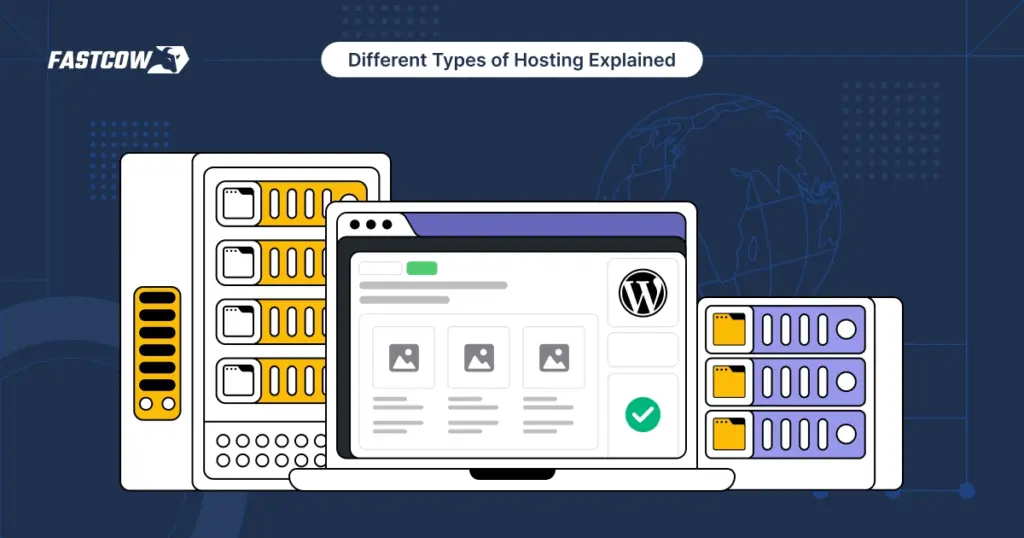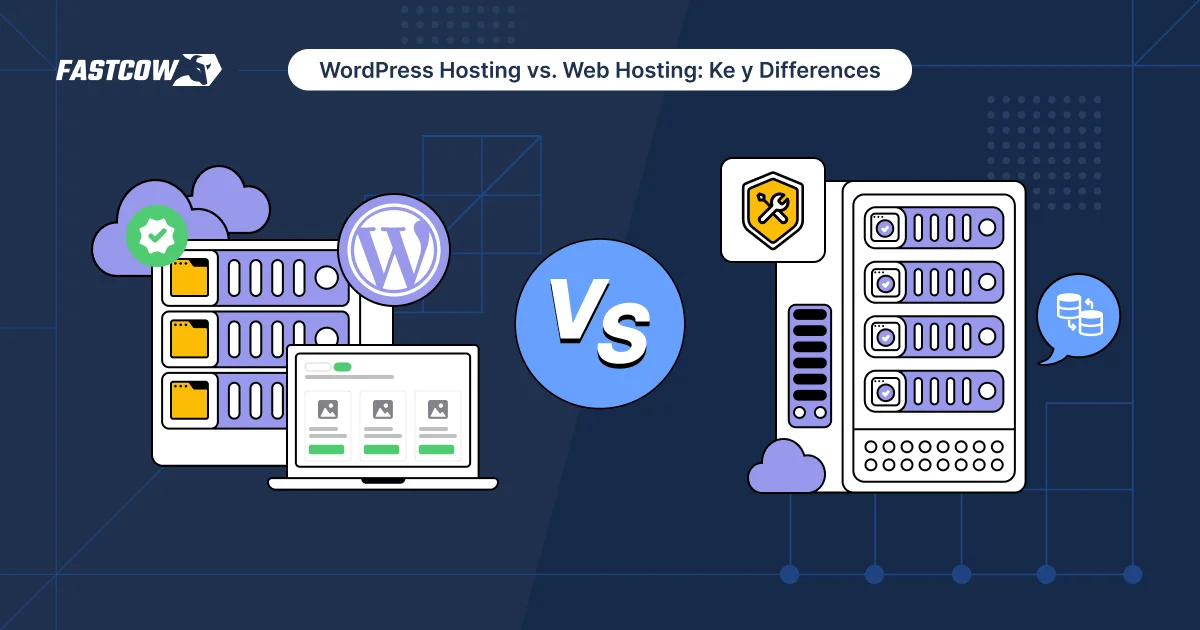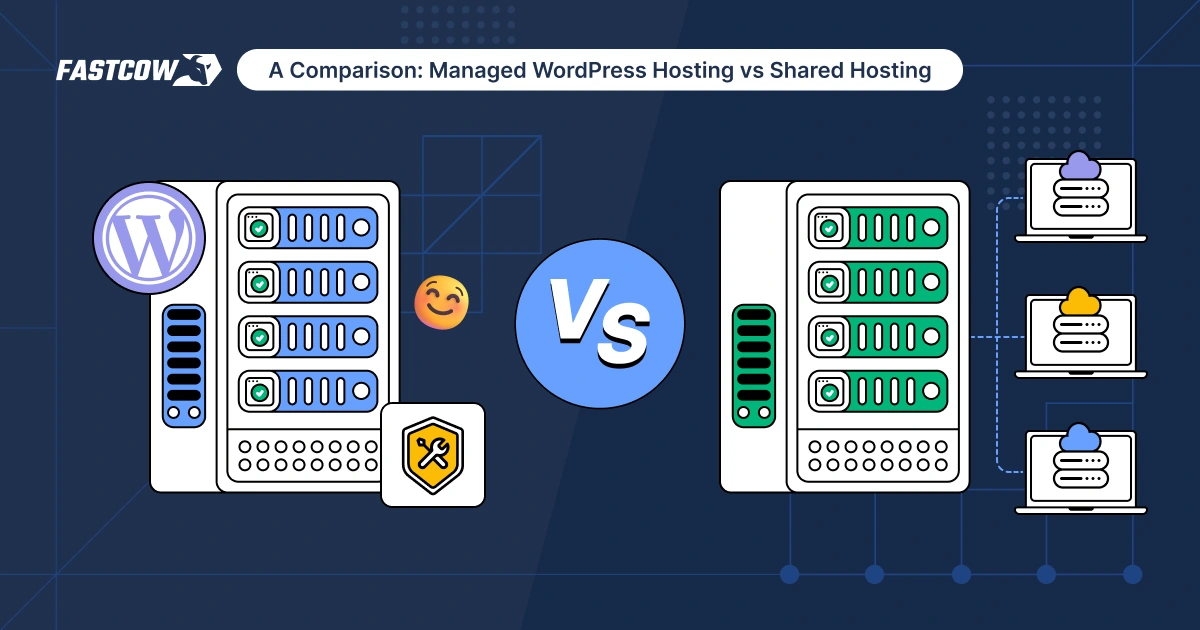
Whether you’re planning to launch a personal blog, an e-commerce store, a portfolio site, or even a high-traffic business website, the type of hosting you choose can make all the difference. Different hosting options are available to meet varying needs. They come with different features and resources customized to fulfill specific requirements. With so many choices available in the market, it can be tricky to figure out which one is right for your website.
The best way to pick the right hosting option is to understand the types of hosting and their differences. The following blog will take you through the types of web hosting with examples of their use cases. At the end, you will be fully equipped to choose the ideal web hosting for your needs.
Let’s begin!
What is Hosting and How Does it Work?
Before we discuss the types of hosting, let’s briefly go over what hosting is and how it works.
Web hosting is a service that allows sites to be accessible on the internet. Every website contains images, files, databases, and code that must be stored somewhere. This storage happens on a web server. This powerful computer can handle online traffic and keep websites running smoothly.
A web host is a company that provides the infrastructure and technology to store your website files on their servers. It ensures your website can be accessed by visitors anytime they type in your domain name. When someone visits your site, their browser connects to the web server, retrieves the necessary files, and displays the website.
There are different types of web hosting services with varying features and pricing options. These services typically include resources like bandwidth, storage space, uptime guarantees, security features, and customer support. Choosing these services and a web hosting service provider carefully is critical since not every web hosting option or provider may suit your budget, preferences, and needs.
9 Types of Web Hosting
Wondering what are the different types of web hosting? The following section will take you through the types of hosting, their pros and cons, and the ideal use cases.
1. Free Hosting
Free hosting allows you to set up a website without paying for server space. It’s usually provided as part of a trial or a way to attract users to upgrade to paid plans. While it’s tempting for beginners, it has major limitations like forced ads, slow performance, and minimal support.
Pros
- No Cost: Perfect for those who don’t want to spend money upfront.
- Simple Setup: Most free hosting providers offer easy-to-use tools, making it beginner-friendly.
- Great for Learning: It’s a good option for experimenting with website creation.
Cons
- Limited Resources: Storage, bandwidth, and features are very basic.
- Ads: Providers often place their ads on your website, which can look unprofessional.
- Low Reliability: Websites may experience downtime or slow loading speeds.
- No Support: Free hosting usually comes with minimal or no customer service.
Ideal Use Cases
- Personal Projects
- Learning and Testing
- Temporary Websites
2. Shared/Virtual Hosting
Shared hosting involves several websites hosted on the same server. These sites share the server's resources like storage and bandwidth. It’s an affordable and easy-to-manage option suited for smaller websites. However, resource sharing can come with performance issues if one website uses too much server capacity.
Pros
- Affordable: Shared hosting is one of the cheapest hosting options available.
- User-Friendly: Most providers offer control panels (like cPanel) and website builders, making it easy to use.
- Maintenance-Free: Server maintenance and updates are handled by the hosting provider.
- Scalable Starter Option: Allows upgrading to better plans as your site flourishes.
Cons
- Performance Issues: If one website on the server gets high traffic, it can slow down others.
- Shared Security Risks: A breach on one website could potentially impact others on the same server.
- Limited Customization: You have limited control over server settings and configurations.
- Not Suitable for High Traffic: If your website grows too big, it may outgrow the server’s capacity.
Ideal Use Cases
- Small Business Websites
- Personal Blogs and Portfolios
- Informational Websites
- Budget-Conscious Users
3. Dedicated Hosting
Dedicated hosting gives you an entire server dedicated to your website. You don’t share resources with anyone else. This results in high performance, better security, and greater control. This hosting type is for large websites or businesses with high traffic and advanced customization needs. However, it’s also one of the pricey options.
Pros
- High Performance: Full access to the server ensures accelerated loading speeds and smooth traffic handling.
- Greater Security: No sharing means lower risks of breaches or attacks caused by other users.
- Full Control: You can configure the server to your exact needs.
- Scalable: Ideal for businesses expecting quick growth or fluctuating traffic.
Cons
- High Cost: Dedicated hosting is significantly more expensive than shared or VPS hosting.
- Requires Technical Expertise: Managing a dedicated server demands advanced skills in configuration, security, and maintenance.
- Overkill for Small Websites: Provides more resources than necessary for small or low-traffic websites, leading to inefficiency.
Ideal Use Cases
- Large E-Commerce Websites
- High-Traffic Websites
- Custom Applications
- Enterprise-Level Businesses
4. Co-located Hosting
Co-located hosting involves renting space in a data center to place your own server hardware. You own the server. However, the data center provides the infrastructure, like power, cooling, and internet connectivity. This gives you full control over your server and access to professional facilities for reliability and security.
Pros
- Full Control: You manage and configure the server hardware and software as you see fit.
- Professional Infrastructure: Benefit from secure and reliable data center facilities, including power backups and cooling.
- Cost Efficiency Over Time: While the upfront cost is high, owning your server can reduce long-term expenses.
- Scalability: Easily upgrade or expand your server hardware as needed.
Cons
- High Upfront Costs: You must purchase the server hardware and pay for co-location space.
- Requires Expertise: Managing and maintaining your own server hardware requires technical knowledge.
- Responsibility for Maintenance: You or your team are responsible for fixing any hardware issues.
- Limited Flexibility: Moving servers between data centers can be difficult and time-consuming.
Ideal Use Cases
- Tech-Savvy Businesses
- Custom Applications
- Data-Heavy Operations
- Long-Term Projects
5. Cloud Hosting

Cloud hosting uses multiple servers connected together to host your website. Instead of relying on a single server, your website pulls resources from a "cloud" of servers. This ensures higher reliability, scalability, and performance, making it an excellent choice for growing or high-traffic websites.
Pros
- High Reliability: If one server in the cloud fails, another automatically takes over.
- Scalability: Resources like storage and bandwidth can be scaled per your requirements.
- Better Performance: Multiple servers working together ensure fast loading times.
- Pay-as-You-Go Pricing: You often pay only for the resources you use, making it cost-effective for varying needs.
Cons
- More Expensive: Cloud hosting is usually pricier than shared or VPS hosting.
- Complex Setup: Managing cloud hosting may require technical knowledge or a managed service provider.
- Variable Costs: Costs can be unpredictable if traffic suddenly increases.
Ideal Use Cases
- High-Traffic Websites
- Growing Businesses
- E-Commerce Stores
- Global Websites
6. VPS (Virtual Private Server) Hosting
VPS hosting provides a dedicated portion of a physical server for your website. You don’t share resources like RAM or storage with other users. This gives more control, reliability, and customization. VPS hosting is ideal for businesses or developers who need more than shared hosting but can’t yet afford a dedicated server.
Pros
- Dedicated Resources: Your website gets its own share of server resources, ensuring better performance.
- Greater Customization: You can configure the server to meet specific needs.
- Better Security: Since resources aren’t shared, there’s less risk of issues caused by other websites.
- Scalability: VPS plans can be upgraded as your website grows.
Cons
- Higher Cost: VPS hosting is more expensive than shared hosting.
- Requires Technical Skills: Setting up and managing a VPS may need advanced knowledge.
- Limited Physical Resources: Since it’s still part of a physical server, there’s a cap on resources compared to cloud hosting.
Ideal Use Cases
- Medium-Sized Businesses
- E-Commerce Websites
- Developers and Tech-Savvy Users
- Websites with Moderate Traffic
7. WordPress Hosting
WordPress hosting is designed to optimize websites built on WordPress - one of the most popular content management systems in the world. This type of hosting provides features like one-click WordPress installation, automatic updates, improved security measures, and performance tuning to ensure a smooth experience for users.
Pros
- Optimized Performance: Servers are configured specifically for WordPress. The result is fast loading speeds and better reliability.
- Ease of Use: Features like pre-installed WordPress, automated backups, and user-friendly dashboards make it beginner-friendly.
- Enhanced Security: Additional measures, such as firewalls and malware scanning, are often included to protect WordPress sites.
- Scalability: Easily upgrade plans as your website grows in traffic and complexity.
- Expert Support: Many WordPress hosting providers like FastCow offer dedicated support teams experienced in WordPress-related issues.
Cons
- Limited Flexibility: WordPress hosting is optimized specifically for WordPress sites, so it may not be ideal for other CMSs or platforms. However, providers like FastCow offer additional hosting options, like Web Hosting and Managed Hosting, to cater to non-WordPress needs.
- Shared Resources: Resources like bandwidth and storage might be shared on entry-level plans. This could impact performance during traffic spikes. FastCow mitigates this with scalable plans and advanced hosting options.
Ideal Use Cases
- Personal Blogs
- Small Business Websites
- E-Commerce Sites
- Portfolio Sites
- Growing Websites
8. Managed Hosting
Managed hosting is a premium service where the hosting provider handles most technical tasks, such as server maintenance, updates, backups, and security. It’s designed for users who want a hassle-free experience and prefer to focus on their website rather than managing the server. Managed hosting is often used for high-traffic websites, including e-commerce stores and business sites.
Pros
- Hands-Off Management: The hosting provider handles technical tasks like updates, backups, and server optimization.
- Improved Security: Managed hosting includes advanced security features like firewalls and malware scanning.
- High Performance: Optimized for speed and reliability, even during high traffic.
- Expert Support: Provides access to dedicated support teams familiar with hosting issues.
Cons
- Higher Cost: Managed hosting is more costly than shared or unmanaged hosting.
- Limited Control: Advanced users may find the lack of access to some server settings restrictive.
- Overkill for Small Sites: Small websites with low traffic may not benefit fully from managed hosting’s features.
Ideal Use Cases
- E-Commerce Websites
- High-Traffic Blogs or Websites
- Business Websites
- Tech-Novice Users
9. Reseller Hosting
Reseller hosting allows you to purchase hosting resources from a provider and then resell them to your clients under your brand. This type of hosting is popular among web developers, agencies, or entrepreneurs who want to offer hosting as a service. You manage your clients while the hosting provider takes care of server maintenance.
Pros
- Business Opportunity: Allows you to start your own hosting business without investing in infrastructure.
- Branding: You can sell hosting under your own brand name.
- Cost-Effective: A single reseller plan can host multiple clients, saving costs.
- Custom Packages: You can create and offer tailored hosting plans to your clients.
Cons
- Dependency on Provider: Your hosting quality depends on the reliability of your hosting provider.
- Technical Responsibility: You’re responsible for managing your clients, including support and troubleshooting.
- Limited Resources: Reseller plans usually have resource limits. This makes them unsuitable for large-scale operations.
Ideal Use Cases
- Web Design and Development Agencies
- Entrepreneurs Starting a Hosting Business
- Freelancers with Clients
- Small Hosting Businesses
Types of Web Hosting and Their Differences
The following table gives a summary of the above points, clearly highlighting the different types of web hosting:
| Type of Hosting | Overview | Pros | Cons | Ideal Use Cases |
| Free Hosting | Basic hosting offered for free, usually with limited features and resources. | - No cost- Simple setup- Great for learning | - Limited resources- Ads on site- Low reliability- No support | - Personal projects- Learning and testing- Temporary websites |
| Shared Hosting | Multiple websites share resources on the same server. | - Affordable- User-friendly- Maintenance-free- Scalable starter option | - Performance issues- Shared security risks- Limited customization- Not for high traffic | - Small business websites- Personal blogs- Budget-conscious users |
| Dedicated Hosting | Entire server dedicated to one website, offering high performance and control. | - High performance- Greater security- Full control- Scalable | - High cost- Requires technical expertise- Overkill for small websites | - High-traffic websites- Large e-commerce sites- Enterprise businesses |
| Co-located Hosting | Renting space in a data center to house your own server hardware. | - Full control- Professional infrastructure- Cost efficiency over time- Scalable | - High upfront costs- Requires expertise- Responsibility for maintenance | - Tech-savvy businesses- Data-heavy operations- Long-term projects |
| Cloud Hosting | Hosting using a network of servers for scalability and reliability. | - High reliability- Scalability- Better performance- Pay-as-you-go pricing | - More expensive- Complex setup- Variable costs | - High-traffic websites- Growing businesses- Global websites |
| VPS Hosting | A dedicated portion of a server, offering more control and resources than shared hosting. | - Dedicated resources- Greater customization- Better security- Scalable | - Higher cost- Requires technical skills- Limited physical resources | - Medium-sized businesses- Developers- Moderate-traffic sites |
| WordPress Hosting | Optimized hosting specifically for WordPress websites. | - Optimized performance- Ease of use- Enhanced security- Scalable- Expert support | - Costly- Limited flexibility- Shared resources on lower-tier plans | - Personal blogs- Small business sites- Growing WordPress sites |
| Managed Hosting | Premium hosting where the provider handles technical tasks like updates and security. | - Hands-off management- Improved security- High performance- Expert support | - Higher cost- Limited control- Overkill for small sites | - E-commerce websites- High-traffic sites- Non-technical users |
| Reseller Hosting | Purchase hosting resources to resell under your brand. | - Business opportunity- Branding- Cost-effective- Custom packages | - Dependency on provider- Technical responsibility- Limited resources | - Web design agencies- Freelancers with clients- Small hosting businesses |
Types of Hosting: Which Option to Choose?

Choosing the right hosting for your website depends on your needs, budget, and technical expertise. Here’s a brief overview to help you decide:
- Free Hosting: This type of hosting is suited for beginners experimenting with websites or small personal projects. It’s cost-free but comes with limited resources, ads, and low reliability.
- Shared Hosting: A budget-friendly option for small websites, blogs, or portfolios. Resources are shared with other sites. This makes it easy to use but less reliable for high traffic.
- Dedicated Hosting: Best for large, high-traffic websites or businesses needing full control and top performance. While expensive and requiring technical skills, it offers unmatched speed and security.
- Co-located Hosting: Great for tech-savvy users or businesses owning server hardware. It offers full control with professional facilities but demands a higher upfront cost and maintenance effort.
- Cloud Hosting: Good option for growing websites or e-commerce stores. Its scalability and reliability make it a popular choice, though it can be more expensive and complex to set up.
- VPS Hosting: Ideal for medium-sized businesses or developers who need more control than shared hosting but can’t afford dedicated hosting. It provides better resources and customization.
- WordPress Hosting: Perfect for WordPress sites, this hosting ensures optimized performance, automatic updates, and improved security. Ideal for bloggers, businesses, and WooCommerce stores, it provides a smooth and reliable hosting experience.
- Managed Hosting: A hands-off solution for high-traffic or e-commerce sites. The provider handles updates, backups, and security while you focus on your website.
- Reseller Hosting: Designed for entrepreneurs or agencies looking to start their own hosting business. It lets you manage clients while the hosting provider takes over server maintenance.
Read More: The London Hairdressing Academy Scales with FastCow
Wrapping Up!
Now that you understand the different types of hosting, it's time to pick the right hosting type for yourself and a reliable hosting provider. For those who need more advice on which hosting solution is best for them, we recommend getting in touch with FastCow.
At FastCow, we offer various hosting solutions to cater to all kinds of websites. Our services include:
- Managed WordPress Hosting: Optimized hosting for WordPress sites with automatic updates and enhanced security.
- Web Hosting: Flexible hosting plans for personal blogs, small businesses, and growing websites.
- WooCommerce Hosting: Powerful hosting designed for secure and fast e-commerce stores.
- Blog Hosting: Reliable and user-friendly hosting for bloggers to share content effortlessly.
- Agency Hosting: Scalable hosting for agencies managing multiple client websites.
- Enterprise Hosting: High-performance hosting for large-scale businesses and mission-critical websites.
Our hosting solutions stand out for their speed, security, and ease of use. They come with features like free SSL certificates, daily backups, and 24/7 customer support. So what are you waiting for?
Visit FastCow today to learn more about our plans and find the perfect hosting solution for your needs!
FAQs
- What are the main types of hosting?
The main types of hosting are Free Hosting, Shared Hosting, Dedicated Hosting, Co-located Hosting, Cloud Hosting, VPS Hosting, WordPress Hosting, Managed Hosting, and Reseller Hosting.
- What is basic hosting?
Basic hosting, like Shared Hosting, provides a simple and affordable option where multiple websites share the same server resources. It’s ideal for small websites and beginners.
- How many web hosting are there?
There are nine primary types of web hosting: Free, Shared, Dedicated, Co-located, Cloud, VPS, WordPress, Managed, and Reseller Hosting.
- What is the best type of web hosting?
The best hosting depends on your needs. For beginners, Shared or WordPress Hosting is great. For high-traffic sites, Cloud or Dedicated Hosting works best. Choose based on your website's size, budget, and technical requirements.
































